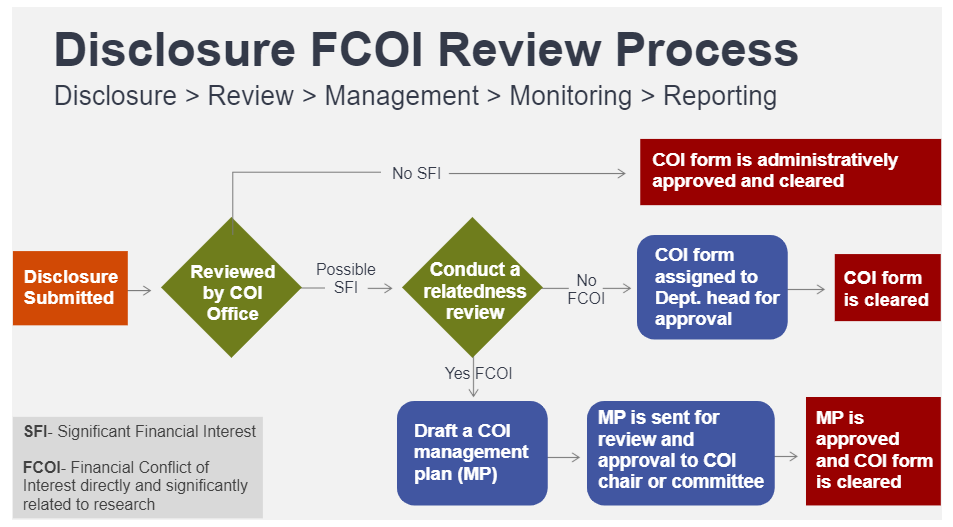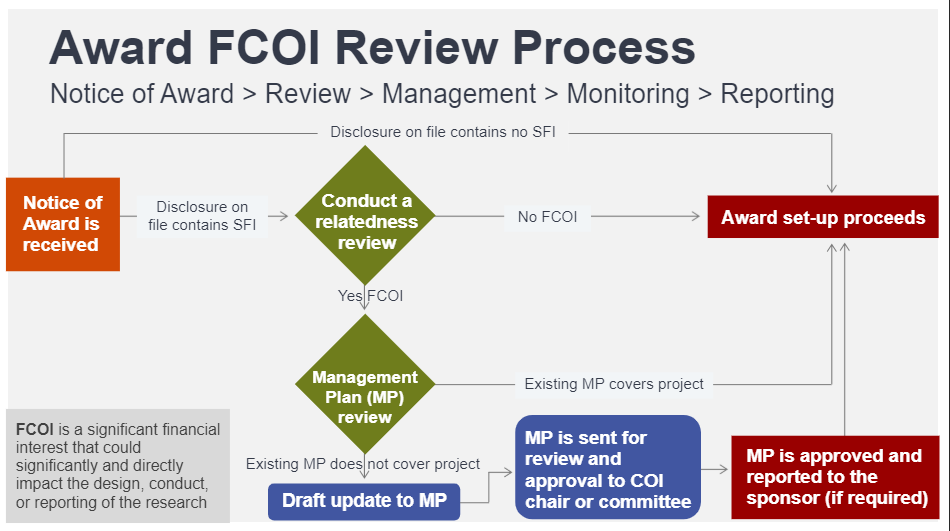Financial Conflicts of Interest: Procedures and Guidance
Filing a Financial Interest disclosure is crucial in complying with federal, state, and university COI regulations and ensuring that individuals and the university avoid penalties for COI non-compliance. The university relies on you to file your annual Financial Interest disclosure and keep it up to date so that it continues to meet its institutional obligations to the UNC System and the agencies that fund university research.
Quick Links
Covered Individuals
How do I file a Financial Interest disclosure form?
To file a Financial Interest disclosure form, log into the Research Enterprise Data (RED) system and select the COI/COC module from the left-hand navigation menu on your homepage. For step-by-step instructions on how to file or update your Financial Interest disclosure in RED, refer to this guide.
Who is required to complete an annual Financial Interest disclosure?
Covered Individuals include:
- Faculty employees (Classified as EHRA Faculty)
- Inclusive of all faculty, including Extension, Teaching and Research
- Exempt Professional Staff (EPS) employees (previously called EHRA Non-Faculty)
- Senior Administrative and Academic Officers (SAAO)
- Any individual, regardless of employment type or status, serving as Senior/Key Personnel on a sponsored research project
- Anyone supported by a particular sponsored research project, as required by specific federal award terms*
*Individuals in this category will be notified of their inclusion and shall be subject to this regulation only for the period of time they participate in the applicable project.
When should a Financial Interest disclosure form be submitted or updated?
Covered Individuals are required to file a Financial Interest disclosure in the Research Enterprise Database (RED) system annually and within 30 days of acquiring or discovering a new Financial Interest. This includes:
- Faculty employees (Classified as EHRA Faculty)
- Inclusive of all faculty, including Extension, Teaching and Research
- Exempt Professional Staff (EPS) employees (previously called EHRA Non-Faculty)
- Senior Administrative and Academic Officers (SAAO)
- Any individual, regardless of employment type or status, serving as Senior/Key Personnel on a sponsored research project
- Anyone supported by a particular sponsored research project, as required by specific federal award terms*
*Individuals in this category will be notified of their inclusion and shall be subject to this regulation only for the period of time they participate in the applicable project.
Are students and postdocs subject to the disclosure requirements captured in REG 01.25.01- Conflicts of Interest and Conflicts of Commitment?
Students and postdocs are only subject to REG 01.25.01 if they are named as Senior/Key Personnel on a proposed or active sponsored project or when participating in a project with an expanded disclosure requirement by the terms and conditions of the award. In either case, the student/postdoc will be notified of the disclosure requirements, and they will only be subject to REG 01.25.01 while participating in the relevant project.
What types of Financial Interest must be disclosed?
All financial interests and those of the individual’s spouse and dependent children that appear to be related to a covered individual’s university employment responsibilities must be reported, regardless of value.
The following are examples of what is (and is not) considered reportable Financial Interest:
| Forms of Financial Interest | REQUIRED to be disclosed (IF related to one’s university employment duties) | NOT required to be disclosed |
|---|---|---|
| Compensation | Any remuneration, regardless of value, including but not limited to : Employment (other than NC State) Consulting activities Service on an advisory board or board of directors Product evaluation payments Legal consulting activities (such as expert witness testimony) Service to a non-profit organization (such as service on a board or consulting) Publishing agreements, Royalties for books, or Authorship Honoraria or other compensation for activities such as talks or educational activities | Salary or other Remuneration paid by NC State Service on advisory committees or review panels paid by U.S. government agencies Income from seminars, lectures, or teaching engagements sponsored by:
|
| Royalties | property rights (e.g., cash royalty payments, milestone payments) received through NC State University and from other academic institutions or organizations | Royalties received through NC State University and Unlicensed Intellectual property that does not generate income |
| Equity/ Ownership Interest (from publicly-traded or privately-held entities) | Ownership Interest in an entity (Stock, Stock Options, Warrants, Vested shares, or other ownership/equity interest) | Income from investment vehicles (such as mutual funds, retirement accounts, and blind trusts) as long as the individual does not have direct control over the investment decisions |
| Sponsored or Reimbursed Travel | Travel for which the covered individual is reimbursed by an outside entity Travel that is paid for on the covered individual’s behalf by an outside entity Includes any registration fees, accommodations, transportation costs, etc. Examples of outside entities: Professional Societies Foreign institutions of higher education and funding agencies For-profit or Non-profit Entities | Travel administered through NC State University, and travel reimbursed or sponsored by the U.S. Federal, State, or local government agency, Other U.S. institutions of higher education, academic teaching hospitals, medical centers, or research institutes affiliated with an institution of higher education |
What happens when I have a Financial Conflict of Interest that requires COI management?
As part of NC State University’s commitment to fostering innovation, Faculty and Staff are encouraged to share and advance knowledge through collaborations with external businesses, academic publications, and the development and licensing of intellectual property. However, the university must comply with federal, state, and sponsor regulations related to conflicts of interest to maintain public trust in the integrity of the University’s research.
To ensure that we uphold standards of objectivity essential for the advancement of knowledge, a carefully controlled and monitored process must be established. The Conflict of Interest (COI) management plan plays a critical role in this process. It is a document that outlines and implements measures to actively reduce, mitigate, or eliminate an employee’s actual, potential, or perceived conflict of interest.
What are the disclosure responsibilities related to Financial Interests when conducting research involving human subjects?
If conducting research involving human subjects, you must provide your Financial Interest disclosure information to the NC State Institutional Review Board (IRB). This requirement is in addition to the requirements of REG 01.25.01 – Conflict of Interest and Conflict of Commitment when filling out your IRB application. Please visit the NC State Human Subjects page for more information about performing research with human subjects, and check out the IRB Policy and SOP 14 – Managing Conflicts of Interest.
How will I know if my Financial Interest disclosure form has been successfully submitted?
You will receive a confirmation email from the COI Office that you have successfully submitted your Financial Interest disclosure. Please contact the COI Office at COI-support@ncsu.edu if you have yet to receive a confirmation email.
Is it permissible for a principal investigator (PI) on a Prime Award to subcontract with a company in which the PI has ownership/equity rights?
Per Section 4 of REG 01.25.01—Conflicts of Interest and Conflicts of Commitment, a subaward cannot be issued to an entity in which the PI has ownership/equity rights. This is to prevent the misuse of university funds for personal gain and to ensure compliance with North Carolina state laws. In the event that other senior/key personnel named on the project have ownership/equity rights in a desired subcontractor, an approved COI management plan might make it permissible.
Disclosure Review Process
Financial Interest disclosures are reviewed by the COI Office to determine if further action is necessary based on the disclosed Financial Interest/Relationship. If no further action is needed due to the absence of a Financial Interest, the disclosure is approved and cleared administratively.
Types of FCOI/Relatedness Review
Annually or Updated Financial Interest Disclosure
Financial Interest disclosed on the updated or annually submitted Financial Interest disclosure will be reviewed against all sponsored research to determine if an FCOI exists.
If an FCOI is identified, the COI Office, in conjunction with the Department heads/Chairs and/or other supervisors, will recommend a COI Management Plan (COI MP) to help eliminate or mitigate any perception of bias in research. The COI Committee/chair reviews approves, and monitors all COI MPs pursuant to University Regulation (REG 01.25.01) and applicable federal regulations.

Project-based FCOI Review
The COI Office will review all Notice of Awards (new awards, to and from contracts- subawards/sub-recipients) against each investigator’s current and up-to-date Financial Interest disclosure to determine if an FCOI exists.
If an FCOI is identified, the COI Office, in conjunction with the Department heads/Chairs and/or other supervisors, will recommend a COI MP to help eliminate or mitigate any perception of bias in research. The COI Committee/chair reviews, approves and monitors all COI MPs pursuant to University Regulations and applicable federal regulations.

Still unsure what to disclose?
Request a consultation